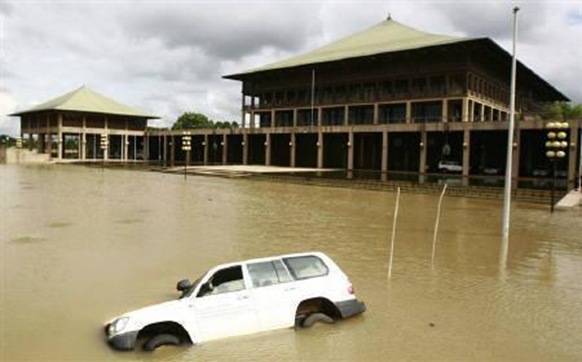 Severe flooding in Sri Lanka has disrupted the lives of around one million people and forced hundreds of thousands to seek refuge in relief camps, aid workers say.
Severe flooding in Sri Lanka has disrupted the lives of around one million people and forced hundreds of thousands to seek refuge in relief camps, aid workers say.
The floods – which are affecting five times more people than Australia’s – have been triggered by continuous rains since Dec. 26, causing streams and dams to overflow mainly in eastern and central parts of the Indian Ocean island.
At least 18 people have also been killed, seven of whom died in a landslide. Aid workers fear the death toll could rise further with some areas remaining inaccessible and forecasts of no let-up in the torrential rains.
“Some areas are difficult to access and people are trapped there. Rivers are overflowing, dams breaking and the main roads can’t be used,” said Father George Sigamoney, secretary general of Caritas in Sri Lanka.
Fourteen of the island’s 25 districts have been hit, with the worst-affected districts being Batticaloa, Ampara and Trincomalee on the eastern coast, where 200,000 people have been uprooted from their inundated villages, most of them fleeing to government relief shelters such as schools.
Sri Lanka’s Meteorological Department says some parts of the eastern island, including Batticaloa district, are experiencing the heaviest rainfall since 1917 and forecast the poor weather will continue in the coming days.
WATER NEEDED
Authorities are leading humanitarian efforts and have deployed 28,000 personnel with boats and helicopters for search and rescue operations and aid distribution.
But access to the flood-hit populations has been hampered due to bad weather and the increasingly higher water levels.
“In Batticaloa City, houses are up to two metres (six feet) under water,” Walter Berier, Malteser International’s programme coordinator in Batticaloa, said in a statement.
“There is barely any drinking water left, it is not possible to buy bottled water, the people are in dire need of water filters — the problem is continuously increasing.”
Relief workers, who are supporting government efforts, say there is also an urgent need for dry rations, tarpaulins and chlorine tablets as well as items such a soap, clothes and blankets.
The U.N. is preparing to launch a flash appeal.
(For updates you can share with your friends, follow TNN on Facebook and Twitter )
